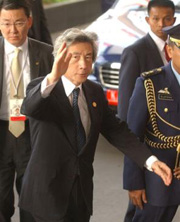|
 |
| Japanese Prime Minister Junichiro Koizumi waves
upon his arrival at the Asia-Africa Summit in Jakarta Friday, April
22, 2005. |
Japan's prime minister expressed "deep remorse " over his country's
World War II aggression against Asian neighbors in a speech Friday at the
Asia-Africa summit in Jakarta — a move aimed at defusing Tokyo's growing
tensions with China.
"In the past Japan through its colonial rule and aggression caused
tremendous damage and suffering for the people of many countries,
particularly those of Asian nations," Japanese Prime Minister Junichiro
Koizumi said at the opening ceremony of the Asian-African Summit in
Jakarta. "Japan squarely faces these facts of history in a spirit of
humility."
Koizumi's apology did not go beyond what Japanese leaders previously
have said, but its delivery at the conference in Indonesia clearly was
aimed at quelling an escalating dispute with China over Tokyo's handling
of its wartime atrocities and its bid for a permanent seat on the U.N.
Security Council.
Japan has sought a one-on-one meeting between Koizumi and Chinese
President Hu Jintao in Jakarta and was hopeful it could be arranged
Friday. But China says it was still considering the proposal. Hu has a
full schedule of bilateral meetings on Friday.
Massive anti-Japanese protests erupted in major
Chinese cities this month after Tokyo approved a new history textbook that
critics say plays down wartime Japanese offenses, including mass sex
slavery and germ warfare
. The protesters also have targeted Tokyo's Security Council bid.
The protests also have been fueled by disputes over gas-drilling in
disputed waters and Koizumi's repeated visits to a wartime shrine in Tokyo
that honors executed World War II war criminals along with 2.5 million
Japanese war dead.
"With feelings of deep remorse and heartfelt apology always engraved in
mind, Japan has resolutely maintained, consistently since the end of World
War II, never turning into a military power but an economic power, its
principle of resolving all matters by peaceful means, without recourse
through the use of force," Koizumi said.
In a move that contrasted with Koizumi's
conciliatory comments, 80 Japanese lawmakers on Friday visited the Yasukuni Shrine
in Tokyo. There
were no Cabinet ministers among the group, which visited the shrine in
observance of an annual spring festival.
In Jakarta, the prime minister said that Japan will stick to a
"peaceful path" and increase its overseas development aid to Asian and
African nations.
Japan's Kyodo News Agency said Koizumi's remarks were based on a 1995
speech made by Tomiichi Murayama, the prime minister at the time, marking
the 50th anniversary of the end of World War II.
Going beyond statements of remorse made by previous Japanese leaders,
Murayama spoke of Japan's "mistaken national policy" that "caused
tremendous damage and suffering to people of many countries" and offered a
"heartfelt apology."
The two-day Indonesian summit draws together 80 nations to commemorate
the 50th anniversary of the first Asia-Africa conference that gave birth
to the Nonaligned Movement, which tried to steer a neutral course between
the United States and the Soviet Union during the Cold War.
(Agencies) | 